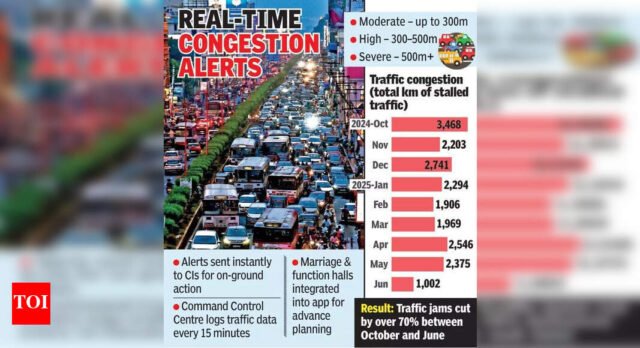Vijayawada: With its bustling streets and rising vehicle count, Vijayawada has long struggled with traffic snarls that frustrate daily commuters. In response, city police have introduced a suite of tech-driven solutions — most notably the ‘Astram’ app, which is reshaping traffic management in real time.The city has already piloted an Intelligent Traffic Management System (ITMS) to streamline movement at key junctions. Officers stationed at intersections now use microphones to issue live directions, improving vehicular flow. But the real breakthrough is ‘Astram’ — a mobile app that monitors congestion and alerts police before gridlocks spiral out of control. ‘Astram’ operates on a three-tier alert system: traffic stalled up to 300 meters is marked ‘Moderate’; between 300 and 500 meters, it’s flagged ‘High’; and anything beyond 500 meters triggers a ‘Severe’ alert. These notifications are instantly sent to Circle Inspectors (CIs), who respond on-site to ease bottlenecks. The proactive model has helped reduce escalation and improve commuter experience across the city.All the data generated by ‘Astram’ is analyzed at the city’s Command Control Centre, which employs a Vertical Message System to log traffic updates every 15 minutes. The system not only records traffic slowdowns but also documents the underlying causes — be it stalled vehicles, protest rallies, or sudden downpours. Once the congestion is cleared, officers upload a photo as proof, making the entire process transparent and accountable.The results are already visible. Traffic jams in Vijayawada have reduced considerably since the introduction of Astram. Data shows that the city reported 3,468 kilometers of stalled traffic in October 2024, which steadily came down to 2,203 km in November and 2,741 km in Dec. The trend continued into the new year, with Jan recording 2,294 km, Feb 1,906 km, and Mar 1,969 km.However, April and May saw temporary spikes. The month of April recorded 2,546 km of stalled traffic, attributed largely to the heavy movement of vehicles during national-level competitive exams, while May reported 2,375 km, caused by unseasonal rains leading to waterlogging across several pockets of the city. By June, with better preparedness, the figure fell sharply to just 1,002 km.Adding another layer of foresight, police have integrated marriage halls and function halls into the Astram database. Organisers of major events are required to upload details such as the expected number of vehicles and VIP attendees in advance. This allows traffic police to plan diversions and crowd-control measures beforehand, ensuring that festivities do not spill over into city-wide jams.







